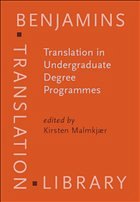Nicht lieferbar

Translation in Undergraduate Degree Programmes
Versandkostenfrei!
Nicht lieferbar
Main description:This book brings together an international team of leading translation teachers and researchers to address concerns that are central in translation pedagogy. The authors address the location and weighting in translation curricula of learning and training, theory and practice, and the relationships between the profession, its practitioners, its professors and scholars. They explore the concepts of translator competence, skills and capacities and two papers report empirical studies designed to explore effects of the use of translation in language teaching. These are complemented...
Main description:
This book brings together an international team of leading translation teachers and researchers to address concerns that are central in translation pedagogy. The authors address the location and weighting in translation curricula of learning and training, theory and practice, and the relationships between the profession, its practitioners, its professors and scholars. They explore the concepts of translator competence, skills and capacities and two papers report empirical studies designed to explore effects of the use of translation in language teaching. These are complemented by papers on student achievement and attitudes to translation in programmes that are not primarily designed with prospective translators in mind, and by papers that discuss language teaching within dedicated translation programmes. The introduction and the closing paper consider some causes and consequences of the odd relationships that speakers of English have to other languages, to translation and ultimately, perhaps, to their "own" language.
Table of contents:
- Introduction
- Translation studies
- The theory behind the practice
- The competencies required by the translator's roles as professional
- Language learning for translators
- Undergraduate and postgraduate translation degrees
- The role of translation studies within the framework of linguistic and literary studies
- Corpus-aided language pedagogy for translator education
- Developing professional translation competence without a notion of translation
- Are L2 learners more prone to err when they translate?
- Students buzz round the translation class like bees round the honey pot - why?
- The effect of translation exercises versus gap-exercises on the learning of difficult L2 structures
- Do English-speakers really need other languages?
- Index
This book brings together an international team of leading translation teachers and researchers to address concerns that are central in translation pedagogy. The authors address the location and weighting in translation curricula of learning and training, theory and practice, and the relationships between the profession, its practitioners, its professors and scholars. They explore the concepts of translator competence, skills and capacities and two papers report empirical studies designed to explore effects of the use of translation in language teaching. These are complemented by papers on student achievement and attitudes to translation in programmes that are not primarily designed with prospective translators in mind, and by papers that discuss language teaching within dedicated translation programmes. The introduction and the closing paper consider some causes and consequences of the odd relationships that speakers of English have to other languages, to translation and ultimately, perhaps, to their "own" language.
Table of contents:
- Introduction
- Translation studies
- The theory behind the practice
- The competencies required by the translator's roles as professional
- Language learning for translators
- Undergraduate and postgraduate translation degrees
- The role of translation studies within the framework of linguistic and literary studies
- Corpus-aided language pedagogy for translator education
- Developing professional translation competence without a notion of translation
- Are L2 learners more prone to err when they translate?
- Students buzz round the translation class like bees round the honey pot - why?
- The effect of translation exercises versus gap-exercises on the learning of difficult L2 structures
- Do English-speakers really need other languages?
- Index




